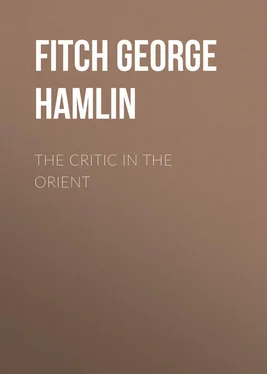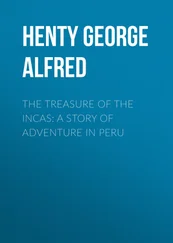George Fitch - The Critic in the Orient
Здесь есть возможность читать онлайн «George Fitch - The Critic in the Orient» — ознакомительный отрывок электронной книги совершенно бесплатно, а после прочтения отрывка купить полную версию. В некоторых случаях можно слушать аудио, скачать через торрент в формате fb2 и присутствует краткое содержание. Жанр: periodic, foreign_antique, foreign_prose, на английском языке. Описание произведения, (предисловие) а так же отзывы посетителей доступны на портале библиотеки ЛибКат.
- Название:The Critic in the Orient
- Автор:
- Жанр:
- Год:неизвестен
- ISBN:нет данных
- Рейтинг книги:5 / 5. Голосов: 1
-
Избранное:Добавить в избранное
- Отзывы:
-
Ваша оценка:
- 100
- 1
- 2
- 3
- 4
- 5
The Critic in the Orient: краткое содержание, описание и аннотация
Предлагаем к чтению аннотацию, описание, краткое содержание или предисловие (зависит от того, что написал сам автор книги «The Critic in the Orient»). Если вы не нашли необходимую информацию о книге — напишите в комментариях, мы постараемся отыскать её.
The Critic in the Orient — читать онлайн ознакомительный отрывок
Ниже представлен текст книги, разбитый по страницам. Система сохранения места последней прочитанной страницы, позволяет с удобством читать онлайн бесплатно книгу «The Critic in the Orient», без необходимости каждый раз заново искать на чём Вы остановились. Поставьте закладку, и сможете в любой момент перейти на страницу, на которой закончили чтение.
Интервал:
Закладка:
In Manila the American tourist has a good opportunity to contrast what has been done by his countrymen with what the British have accomplished in ports like Hongkong and Singapore. Doubtless the English plan will show the larger financial returns, but it is carried out with a selfish disregard of the interests of the natives which stirs the gorge of an American. The Englishman believes in keeping a wide gulf between the dominant and the humble classes. He does not believe in educating the native to think that he can rise from the class in which he is born. The American scheme in the Philippines has been to encourage the development of character and efficiency, wherever found; and the result is that many public positions are open to men who were head-hunting savages ten years ago. Above all other things in the Philippines we have proved, as we have shown at Panama, that a tropical climate need not be an unhealthful one. We have banished from Manila cholera, yellow fever and bubonic plague – three pests that once made it dreaded in the Orient. This, with an ample water supply, is an achievement worthy of pride, when one contrasts it with the unsanitary sewerage system of Hongkong and Singapore.
The small part of the great Chinese Empire which I was able to see gave me a vivid impression of the activity and enthusiasm of the people in spreading the new Republican doctrines. The way old things have been put aside and the new customs adopted seems almost like a miracle. Fancy a whole people discarding their time-honored methods of examination for the civil service, along with their queues, their caps and their shoes. All the authorities have predicted that China would be centuries in showing the same changes which the Japanese have made in a single generation; but recent events go far to prove that Japan will be outstripped in the race for progress by its slow-going neighbor. What profoundly impresses any visitor to China is the stamina and the working capacity of the common people. Tireless laborers these Chinese are, whether they work for themselves or the European. What they will be able to accomplish with labor-saving machinery no one can predict. Certainly should they accept modern methods of work, with the same enthusiasm that they have adopted new methods of government, the markets of the world will be upset by the product of these four hundred million. China is to-day in transformation – fluctuant, far-reaching, limited only by the capacity of a singularly excitable people to absorb new ideas.
In India great is the contrast to China and Japan. Here is an old civilization, founded on caste: here are many peoples but all joined to the worship of a system that says the son must follow in the footsteps of the father; that one cannot break bread with a stranger of another caste lest he and his tribe be defiled. Nothing more hideous was ever conceived than this Indian caste system, yet it has held its own against the force of foreign learning and probably will continue to fetter the development of the natives of India for centuries to come. Some simple reforms the English have secured, like the abolition of suttee and the improved condition of the child widows; but their influence on the great mass of the people has been pitiably small. India bears the same relation to the Orient that Italy does to Europe. It is the home of temples, palaces and monuments; it is the land of beautiful art work in many materials. Most of its cities have a splendid historical past that is seen in richly ornamented temples and shrines, in the tombs of its illustrious dead and in palaces that surpass in beauty of decoration anything which Europe can boast.
In considering India it must always be borne in mind that here was the original seat of the Aryan civilization and that, though the Hindoo is as dark as many of the American negroes, he is of Aryan stock like ourselves. In comparison with the men who carried Aryan civilization throughout the world, the Hindoo of to-day is as far removed as is the modern Greek from the Greek of the time of Pericles and Phidias. Yet he shows all the signs of race in clear-cut features and in small hands and feet.
The journey throughout India is one which calls for some philosophy, as the train arrangements are never good and, unless one has the luck to secure a competent guide, he will be annoyed by the excessive greed of every one with whom he comes in contact. But aside from such troubles the trip is one which richly repays the traveler. If one has time it is admirable to go off the beaten track to some of the minor places which have fine historical remains; but a good idea of India may be obtained by taking the regular route from Calcutta to Bombay, by way of Delhi.
In Benares the tourist first meets the swarms of beggars that make life a burden. Aged men, with loathsome sores, stand whining at corners beseeching the favor of a two-anna piece; blind men, led by small, skinny children, set up a mournful wail and then curse you fluently when you pass them by, and scores of children rise up out of hovels at the roadside and pursue your carriage with shrill screams. All are filthy, clamorous, greedy, inexpressibly offensive. If you are soft hearted and give to one, then your day is made hideous by a swarm of mendicants, tireless in pursuit and only kept from actual invasion of the carriage by fear of the driver's whip.
The feature which makes travel on Indian railways a weariness of the flesh is the roughness of the cars. Each truck on the passenger cars is provided with two large wheels, exactly like those on freight cars, and these wheels have wooden felloes and spokes. With poor springs the result is that though the road-bed is perfect the cars are as rough as our freight cars. When the speed is over twenty-five miles an hour or the road is crooked, the motion of the cars is well nigh intolerable. Ordinarily the motion is so great that reading is difficult and writing out of the question. At night the jar of the car is so severe that one must be very tired or very phlegmatic to get any refreshing sleep. When one travels all day and all night at a stretch – as in the journey from Jeypore to Bombay – the fatigue is out of all proportion to the distance covered. In fact Americans have been spoiled by the comforts of Pullman sleeping-cars, in which foreign critics find so many flaws. Probably the chief annoyance to our party of Americans, aside from the jar of the cars, was the dust and soot which poured in day and night. The engines burn soft coal and the dust on the road-beds is excessive. A system of double windows and well-fitting screens would remove this nuisance, but apparently the British in India think dust and grime necessary features of railway travel, for no effort is made to eliminate them.
No Oriental trip would be complete without a visit to Egypt, and especially a ride on the Nile. It is more difficult to make anyone realize the charm of Egypt than of any other country of the Orient. The people are dirty, ignorant, brutish: their faces contain no appeal because they are the faces of Millet's "The Man With the Hoe." Centuries of subjection have killed the pride which still lingers in the face and bearing of the poorest Arab; the Egyptian peasant does not wear the collar of Gurth, but he is a slave of the soil whose day of freedom is afar off. Yet these degenerate people are seen against a background of the most imposing ruins in the world. Luxor and Karnak and the tombs of the kings near old Thebes contain enough remains of the splendor of ancient Egyptian life to permit study for years. The mind is appalled by this mass of temples, monuments, obelisks and colossal statues. It is difficult to realize that the same people who are seen toiling in the fields to-day raised these huge monuments to perpetuate the names of their rulers. A climate as dry as that of the Colorado desert has preserved these remains, so that in the rock tombs one may gaze upon brightly painted hieroglyphs of the time of Moses that look as though they were carved yesterday.
Читать дальшеИнтервал:
Закладка:
Похожие книги на «The Critic in the Orient»
Представляем Вашему вниманию похожие книги на «The Critic in the Orient» списком для выбора. Мы отобрали схожую по названию и смыслу литературу в надежде предоставить читателям больше вариантов отыскать новые, интересные, ещё непрочитанные произведения.
Обсуждение, отзывы о книге «The Critic in the Orient» и просто собственные мнения читателей. Оставьте ваши комментарии, напишите, что Вы думаете о произведении, его смысле или главных героях. Укажите что конкретно понравилось, а что нет, и почему Вы так считаете.












